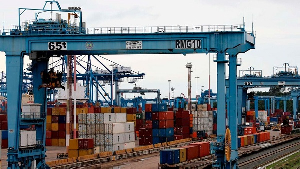Kenyan importers have been spared the troubling charges on container guarantees at the Port of Mombasa, which will enable them to also avoid demurrage charges incurred on delayed clearances.
The move, which follows Tanzania’s, came after shippers and clearing agents struck a deal that would allow importers to settle any charges on damaged containers on returning them to a shipper, not before taking the cargo as before.
Traditionally, shipping lines charge $500 on 20-foot containers for local imports and $1,000 for a 40-foot container guarantee (CG) in case containers are lost, damaged, or returned dirty. Goods destined for neighbouring countries incur more expenses. Importers pay $1,000 for a 20-foot container and $5000 for a 40-foot, depending on the risks involved.
This week, four shipping lines including CMA CGM and MSC/Ocean Freight, shipping agents, and over 25 percent clearing companies signed a memorandum of understanding with Viaservice Company, which will cover containers while allowing importers to take their cargo to their destination. The company will allow those who sign a deal with it to clear the goods and only settle any dues upon returning the container.
This move has been adopted in Tanzania already since 2020 and allows importers to clear goods while the firm fully secures the commercial interest of shipping lines and agents, instead of importers having to deposit money to the agents.
Via service, issues guarantee in favor of shipping line or agent on behalf of registered customs agents, freight forwarders, and shippers. The shippers then waive the charges due to the container.
Morgan Lépinoy, the Global head of trade facilitation and managing director at Viatrans, the parent firm of Viaservice said the alternative guarantee could help speed up trade.
“It makes the whole process more efficient and is powered by a digital platform,” he said on Tuesday.
“It addresses the challenges of container deposits, one of emerging markets’ major trade barriers which consume enormous working capital, estimated at $1.5 million in East Africa alone and substantially increases the cost of doing business.”
“Riding on the success of the CG in Tanzania, the company is developing a trade finance solution with a view to bridging the huge financing gap that continues to undermine the growth and expansion of the transport logistic sector.”
In Kenya, traders may clear several containers at once. The Port of Mombasa often faces congestion from delayed clearances as traders chase paperwork.
Mr John Karisa, an importer said the cost of container bonds often affects final consumer prices.
“We have not been able to afford to import large quantities since each container is subjected to about $500 in charges. It is higher on 40-foot containers, making it very expensive. That cost often comes down to the consumer,” said Mr Karisa.
The Intergovernmental Standing Committee on Shipping (ISCOS), which has signed a working Memorandum of Understanding (MoU) with Viaservice, had proposed an end to cash deposits.
“We have suggested doing away with cash deposits as a container guarantee, and moving to the use of other forms of guarantees,” ISCOS Secretary General Daniel Kiange said.
Elias Baluku, an official at the Federation of East African Freight Forwarders Associations said Viaservice will help eliminate a non-tariff barrier.
“Use of technology to manage the CG cycle has reduced human intervention thus saving time while increasing transparency and accountability of transport logistics services,” Mr Baluku in an earlier interview.
Africa News of Sunday, 1 September 2024
Source: theeastafrican.co.ke

















